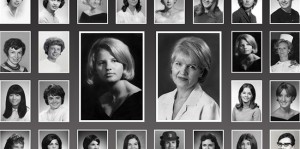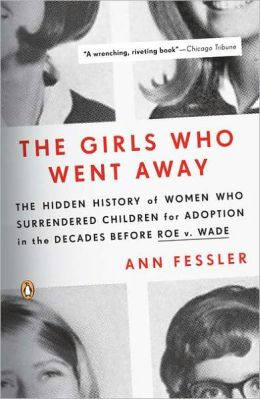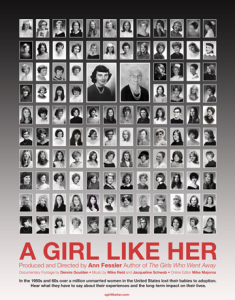BOOK REVIEW
The Girls Who Went Away
By Ann Fessler

In this deeply moving and myth-shattering work, Ann Fessler brings out into the open for the first time the astonishing untold history of the million and a half women who surrendered children for adoption due to enormous family and social pressure in the decades before Roe v. Wade. An adoptee who was herself surrendered during those years and recently made contact with her mother, Ann Fessler brilliantly brings to life the voices of more than a hundred women, as well as the spirit of those times, allowing the women to tell their stories in gripping and intimate detail. Today, when the future of the Roe decision and women’s productive rights stand squarely at the front of a divisive national debate, Fessler brings to the fore a long-overlooked history of single women in the fifties, sixties, and early seventies.
In 2007, the book was a finalist for the National Book Critics Circle Award.
In 2014 , Ann Fessler won the Adoption Trailblazer Award.
 The Girls Who Went Away: The Hidden History of Women Who Surrendered Children for Adoption in the Decades Before Roe v. Wade
The Girls Who Went Away: The Hidden History of Women Who Surrendered Children for Adoption in the Decades Before Roe v. Wade
By Ann Fessler
Hardcover, 354 pages
Published: May 4th 2006 by Penguin Press HC
ISBN: 1594200947 (ISBN13: 9781594200946)
Edition language: English
Nominee for General Nonfiction (2006)
Purchase The Girls Who Went Away on Amazon
FILM SYNOPSIS
A Girl Like Her
 A Girl Like Her reveals the hidden history of over a million young women who became pregnant in the 1950s and 60s and were banished to maternity homes to give birth, surrender their children, and return home alone. They were told to keep their secret, move on and forget. But, does a woman forget her child?
A Girl Like Her reveals the hidden history of over a million young women who became pregnant in the 1950s and 60s and were banished to maternity homes to give birth, surrender their children, and return home alone. They were told to keep their secret, move on and forget. But, does a woman forget her child?
The film combines footage from educational films and newsreels of the time period about dating, sex, “illegitimate” pregnancy, and adoption—that both reflected and shaped the public’s understanding of single pregnancy during that time—with the voices of these mothers as they speak today, with hindsight, about the long-term impact of surrender and silence on their lives.

